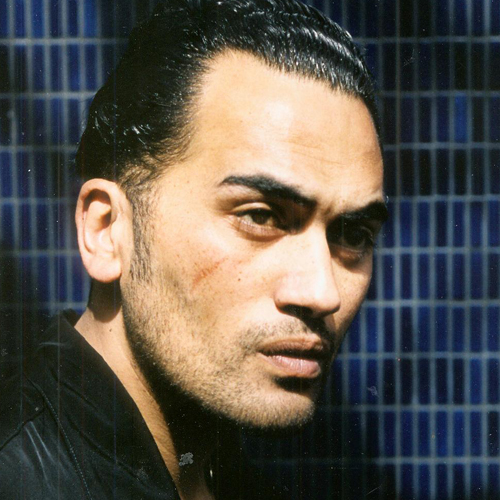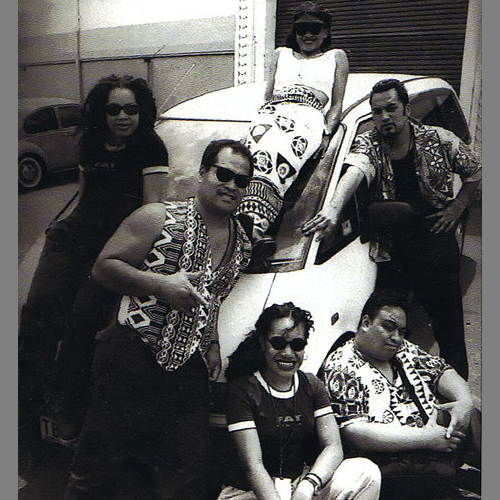
Pauly Fuemana (OMC)
Born: 8 February 1969
Died: 31 January 2010 (41 Years)
Cause: He had been diagnosed with chronic inflammatory demyelinating polyneuropathy, an extremely rare neurological disorder similar to multiple sclerosis. Fuemana kept his illness private. He died in 2010, a week before his 41st birthday.
Died: 31 January 2010 (41 Years)
Cause: He had been diagnosed with chronic inflammatory demyelinating polyneuropathy, an extremely rare neurological disorder similar to multiple sclerosis. Fuemana kept his illness private. He died in 2010, a week before his 41st birthday.

OMC
Paul Lawrence Fuemana (8 February 1969 – 31 January 2010) was a Niuean-New Zealand singer, songwriter and musician from Auckland. One of the first globally successful pioneers of his country's unique style of hip-hop, Fuemana was one of New Zealand's greatest popular music icons of the 1990s.
Born in Otara, South Auckland, to a Niuean father and a Māori mother, Pauly had a difficult, poverty-stricken childhood, where his only real enjoyment came from making music with his brothers. Speaking Niuean as his first language, he saw the world in a uniquely Polynesian way, and made music accordingly. Leading the rap trio and then joint music project, the Otara Millionaires Club (abbreviated to OMC) his 1996 debut album How Bizarre and its eponymous lead single became a huge success across the world. The name OMC was ironic, as its namesake of his home of Otara was one of the poorest communities in the whole of the large island nation. Along with his brother Phil Fuemana, Pauly cultivated the unique South Auckland musical genre of Urban Pasifika, bringing it to worldwide commercial and critical acclaim.
Fuemana was often considered a one-hit wonder because of the unequalled success of "How Bizarre", which overshadowed his other, relatively successful work, such as the singles "On the Run", "Never Coming Back" and "Land of Plenty". In a 1997 interview, he reflected on what was once a witticism to himself and his home – an "Otara millionaire" – now represented his reality. Shortly after his rise to fame, OMC was put on indefinite hiatus due to disputes with his US record label. In 1998, he was also involved in a lawsuit filed by his producer and co-writer Alan Jansson over royalties due to Jansson.
It was settled in arbitration. Fuemana focused on his wife Kristine and six children, but grew sick during the mid 2000s; by the end of the decade, he had been diagnosed with chronic inflammatory demyelinating polyneuropathy, an extremely rare neurological disorder similar to multiple sclerosis. Fuemana kept his illness private. He died in 2010, a week before his 41st birthday.
Posthumously, his music has found success on TikTok.
(wikipedia)
Born in Otara, South Auckland, to a Niuean father and a Māori mother, Pauly had a difficult, poverty-stricken childhood, where his only real enjoyment came from making music with his brothers. Speaking Niuean as his first language, he saw the world in a uniquely Polynesian way, and made music accordingly. Leading the rap trio and then joint music project, the Otara Millionaires Club (abbreviated to OMC) his 1996 debut album How Bizarre and its eponymous lead single became a huge success across the world. The name OMC was ironic, as its namesake of his home of Otara was one of the poorest communities in the whole of the large island nation. Along with his brother Phil Fuemana, Pauly cultivated the unique South Auckland musical genre of Urban Pasifika, bringing it to worldwide commercial and critical acclaim.
Fuemana was often considered a one-hit wonder because of the unequalled success of "How Bizarre", which overshadowed his other, relatively successful work, such as the singles "On the Run", "Never Coming Back" and "Land of Plenty". In a 1997 interview, he reflected on what was once a witticism to himself and his home – an "Otara millionaire" – now represented his reality. Shortly after his rise to fame, OMC was put on indefinite hiatus due to disputes with his US record label. In 1998, he was also involved in a lawsuit filed by his producer and co-writer Alan Jansson over royalties due to Jansson.
It was settled in arbitration. Fuemana focused on his wife Kristine and six children, but grew sick during the mid 2000s; by the end of the decade, he had been diagnosed with chronic inflammatory demyelinating polyneuropathy, an extremely rare neurological disorder similar to multiple sclerosis. Fuemana kept his illness private. He died in 2010, a week before his 41st birthday.
Posthumously, his music has found success on TikTok.
(wikipedia)

